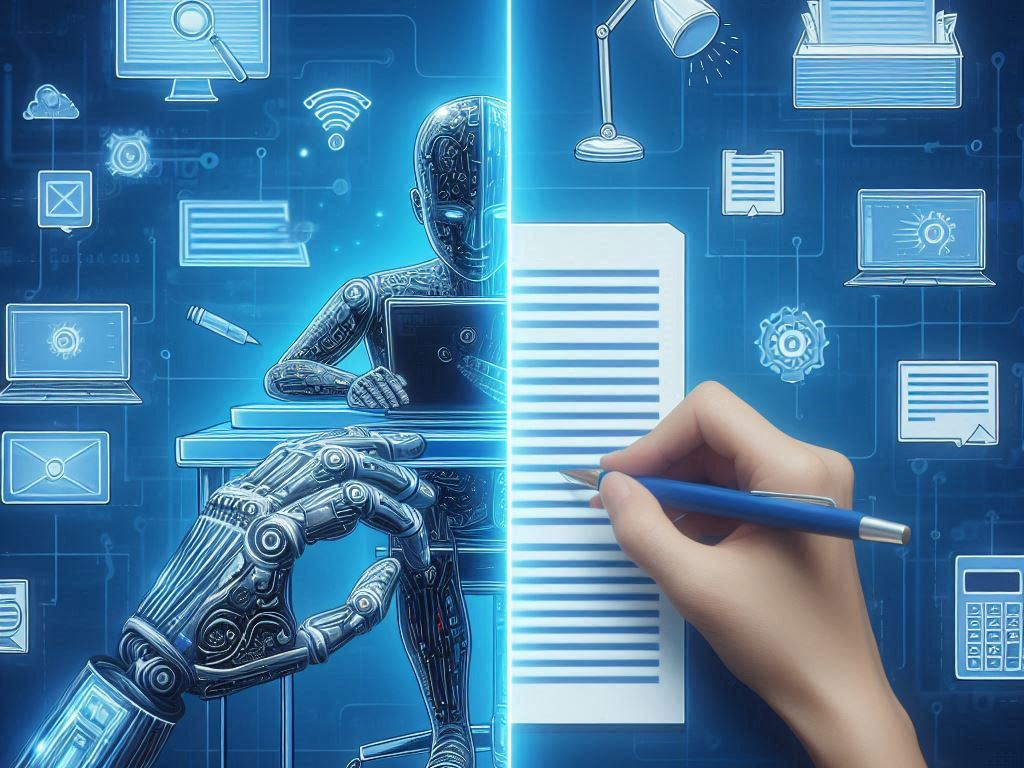As I start writing this article, I am reminded of the number of times I have heard people asking, “Will AI replace human writers?” My answer remains “no.” The fact is that AI is buzzing all around. It has brought revolution in almost every sector, and the content creation industry is not an exception to it either. AI is revolutionizing the way we create as well as consume content. But the real question remains: can AI actually replicate the soul of human creativity, emotional connection, and empathy?
We live in a crammed digital space where
Attention spans have been shorter than that of a goldfish’s memory.
The king of content reigns only if engaging.
Algorithms watch you, waiting to judge your worth.
This makes it crystal clear how to find your way through the noise. In this dense landscape, no doubt, speed is crucial, but so is connection. AI churns out content at breakneck speeds yet always misses human touch. Real connection comes through stories that resonate and evoke emotions. Let’s walk through this journey together and explore whether it is technology or heart that creates the real connection.
AI-Generated Content:
AI tools can quickly produce content. It takes only minutes to create articles, social media posts, or product descriptions and also to refine a content strategy or analyze audience engagement. The optimization process may become easier with AI tools. Of course, AI triumphs in data processing. It’s an amazingly powerful tool for crunching data, creating reports, and optimizing content for a search engine. This lack of soul, nuances, and creativity makes it a relatively unsatisfying solution.
The Human Touch: What AI Can’t Replicate?
A human writer pours his or her heart and soul into a piece of writing. There is a thought process behind each and every word. The experience, emotion, and observation of a writer all go into the piece of writing. On the other hand, AI produces content with the aid of algorithms and data sets. AI searches for and reads the most popular articles on the internet. It reads and evaluates to determine relevance and then manufactures an article around this. Essentially, it analyzes content and just summarizes it.
The Power of Storytelling
We humans are born masters of storytelling. A human writer can create rich narrative lines and evoke feelings. That is why a human-written piece of content is more relatable. AI-generated content feels hollow or sterile. There’s no warmth, no personal touch about it.
Human content creators are strong in several key points, including
- Creativity: Human beings bring their own originality, experiences, and depth to what they write. It sparks the fire to be of interest or remembered.
- Contextual Knowledge: Humans naturally pick up on nuances and subtleties within a language and culture. That will make content with a deeper resonance from the audience’s view.
- Quality Control: As much as quality assurance would be hard for humans to do on their work, error and polish of tone might be done. That enhances the overall quality of content.
But human content production is not without challenges.
- Time-consuming: Quality content always takes time. From research to writing and ending with revisions, it needs time. Humans cannot generate such volumes of content like AI does in such a short time.
- Scalability Issues: This is another challenge. It becomes hard to ramp up content production quickly if you only rely on human writers, especially when businesses have to make large demands.
- Cost: Hiring skilled writers is expensive, and any company that doesn’t have a large enough budget might find it challenging to hire the best writers in the market.
Hybrid Approach
What we need is collaboration between man and machine, not a fight. The monotonous/tedious works shall be done through machines, saving more time for creative parts in the process of content creation. Together, both the mediums can create content that informs, creates engagement, and creates lasting memories.
Examples in the Real World
For example, the New York Times. AI enables them to create data-driven stories, yet it is the human who writes a deeper and more interesting story that would capture readers’ attention. Similarly, HubSpot uses AI for content optimization, but only a human writer can write a story, which may have the possibility of achieving something with the reader on an emotional level and eventually create engagement.
To conclude,
In such fast-pacing revolution changes in content creation, it never ignores the human element because humans are never dummies that can be substituted by AI. It is our perspectives in life, our feelings, and our experiences that give life to our writings in the very true sense of what writing should be.
Well, the next time you think you want to ask that question, “Can AI replace a human writer?” remember, it’s where the heart of content creation lies—in the human touch.

Leave a Reply